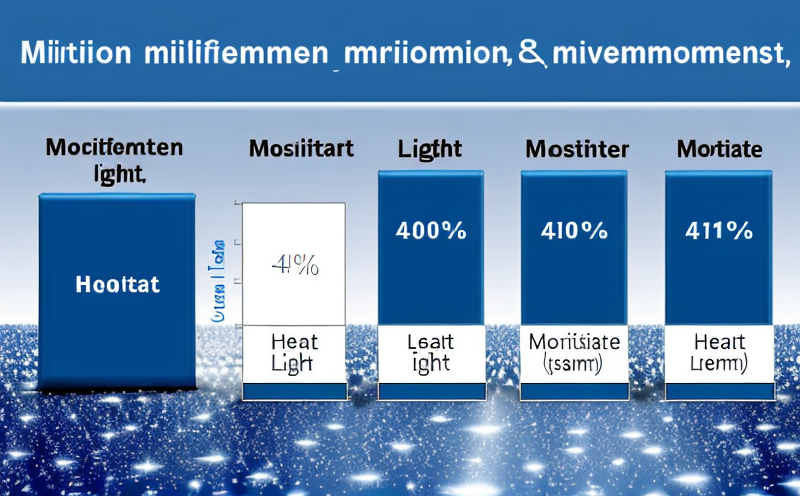Simulating migration scenarios under different environmental conditions (e.g., heat, light, moisture) to assess packaging performance
Simulating Migration Scenarios A Crucial Step in Ensuring Packaging Performance
In todays fast-paced business landscape, ensuring the integrity of packaging is more critical than ever. With the rise of e-commerce and global supply chains, products are often exposed to various environmental conditions during transportation and storage. This exposure can lead to degradation of packaging materials, compromising the safety and efficacy of the products they contain.
To mitigate these risks, businesses must invest in thorough testing and evaluation of their packaging systems. One essential service that helps assess packaging performance under different environmental conditions is simulating migration scenarios. By replicating real-world conditions in a laboratory setting, manufacturers can evaluate how their packaging responds to heat, light, moisture, and other environmental stressors.
What is Simulating Migration Scenarios?
Simulating migration scenarios involves subjecting packaging materials to controlled conditions that mimic real-world environments. This service enables businesses to predict how their packaging will perform under various conditions, including
Temperature fluctuations (e.g., high heat, freezing temperatures)
Light exposure (e.g., UV radiation, fluorescent lighting)
Moisture levels (e.g., humidity, immersion in water)
By simulating these scenarios, Eurolabs experts can assess the packagings integrity and identify potential weaknesses. This critical information allows businesses to make informed decisions about their packaging designs, ensuring that they meet regulatory requirements and maintain product quality.
Advantages of Simulating Migration Scenarios
Utilizing simulating migration scenarios offers numerous benefits for businesses
Enhanced Product Safety By evaluating packaging performance under various conditions, manufacturers can identify potential hazards and design safer products.
Compliance with Regulatory Requirements Simulating migration scenarios helps ensure that packaging meets regulatory standards, reducing the risk of non-compliance and associated fines.
Improved Packaging Efficiency Identifying areas for improvement in packaging design enables businesses to optimize their systems, reducing material waste and costs.
Increased Customer Satisfaction By ensuring products arrive at their destination safely and intact, manufacturers can enhance customer satisfaction and loyalty.
Reduced Liability Simulating migration scenarios helps mitigate the risk of product recalls, reputational damage, and financial losses.
Key Benefits
Predictive Maintenance Identify potential issues before they occur, reducing downtime and maintenance costs.
Cost Savings Optimize packaging design to reduce material waste, transportation costs, and storage space requirements.
Informed Decision Making Leverage data-driven insights to inform packaging decisions, ensuring alignment with business goals and objectives.
Regulatory Compliance Ensure packaging meets or exceeds regulatory standards, reducing the risk of non-compliance and associated penalties.
Competitive Advantage Differentiate your brand by prioritizing product safety and quality, setting you apart from competitors.
QA Frequently Asked Questions about Simulating Migration Scenarios
What types of products benefit from simulating migration scenarios?
Any product that requires packaging, including food, beverages, pharmaceuticals, cosmetics, and consumer goods.
How do I prepare my packaging for testing?
Provide Eurolab with your packaging specifications, including materials, dimensions, and any relevant certifications.
What are the typical environmental conditions simulated in the laboratory?
Temperature (high heat, freezing), light exposure (UV radiation, fluorescent lighting), moisture levels (humidity, immersion in water).
How long does a simulation test typically take?
Test duration varies depending on the specific scenario and packaging type; Eurolabs experts will provide a customized timeline for each project.
What kind of data can I expect from simulating migration scenarios?
Eurolab provides comprehensive reports detailing packaging performance under various conditions, including migration rates, material degradation, and any signs of compromise.
Invest in the Future of Your Packaging
Dont wait until its too late invest in simulating migration scenarios today. By leveraging Eurolabs expertise and cutting-edge facilities, you can ensure that your packaging meets the demands of an increasingly complex global market.
Get in touch with our team to discuss how simulating migration scenarios can benefit your business. Let us help you safeguard your products, protect your brand reputation, and stay ahead of the competition.
-
Testing the migration of substances from packaging materials into pharmaceutical products
-
Assessing the risk of chemical migration from packaging components into drug formulations
-
Simulating the migration of plasticizers, monomers, or other residual substances into the product
-
Testing the migration of inks, adhesives, and other non-packaging components into pharmaceutical products
-
Evaluating the effect of time, temperature, and humidity on migration levels in packaging materials
-
Testing for the migration of moisture or gases from packaging materials into sensitive drug products
-
Simulating the effect of migration on the stability and safety of pharmaceutical products
-
Assessing migration rates of harmful substances from packaging over long-term storage periods
-
Testing the potential for migration of chemicals from packaging materials during transportation
-
Evaluating the safety of packaging materials based on migration study results and regulatory standards
-
Testing for migration from specific packaging materials like plastics, glass, or aluminum
-
Testing for migration levels in packaging materials used for both solid and liquid pharmaceutical products
-
Assessing migration potential through accelerated testing techniques and long-term storage simulations
-
Testing migration in different pharmaceutical packaging systems, such as blister packs or bottles
-
Evaluating the effectiveness of barrier materials in preventing the migration of substances from packaging
-
Simulating the effect of migration on the shelf life and quality of pharmaceutical products
-
Assessing the migration of substances from packaging components into both active and inactive ingredients
-
Testing migration using specific regulatory methods to ensure compliance with pharmaceutical packaging standards
-
Evaluating migration under stress testing conditions like vibration, pressure, and impact during transport
-
Testing for the migration of volatile substances, including solvents and plasticizers, from packaging materials
-
Testing the migration of packaging materials in direct contact with sensitive pharmaceutical ingredients
-
Verifying packaging safety through comprehensive migration studies to meet industry regulations




